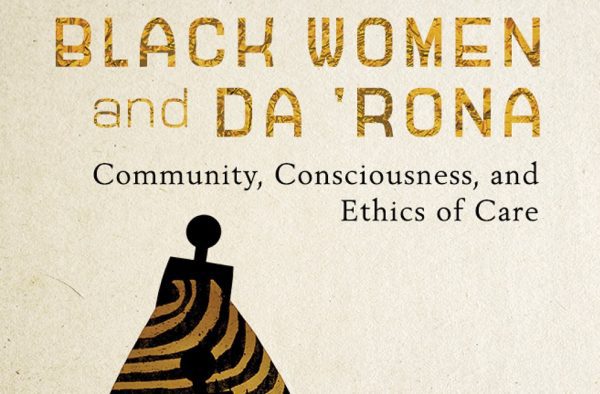W + GRA Executive Director and UNC Charlotte faculty discuss impact of the pandemic in Black Women and Da’rona

written by Janice Mukhia
The COVID-19 pandemic was life-changing for many across the globe. For Black women, the pandemic exacerbated existing issues that extended beyond socio-economic parameters to contending with mental, physical and emotional challenges. They suddenly found themselves entasked with new roles and responsibilities. These collective experiences and the need to create safe spaces for Black Women and their families are captured in Black Women and da Rona: Community, Consciousness and Ethics of Care, a new book that is set to be published in April 2023.
Dr. Michelle Meggs, Executive Director of the Women + Girls Research Alliance (W + GRA), a division of urbanCORE at UNC Charlotte was one of the writers for a chapter entitled “Da Rona and a Virtual Kitchen Table Politics of Community.” Dr. Meggs co-wrote the chapter with Ashley E. Hollinghead, a doctoral candidate at Rutgers University. The chapter highlighted ways in which Black women continue to create empowering spaces for themselves in the midst of a pandemic. Dr. Meggs and Hollinghead utilized Rev. Dr. Melva Sampson’s Pink Robe Chronicles’ Facebook community as a case study to highlight how Black women use online spaces to maintain their physical, emotional, and psychological health by focusing on and reimagining holistic self-care through purposeful action and a commitment to caring for one another.
W+GRA Seed Grant recipients and UNC Charlotte faculty Dr. Tehia Starker Glass, Dr. Kendra Jason, and Dr. Janaka B. Lewis, along with colleagues Dr. Candace S. Brown (Public Health and Gerontology), and Kaja Dunn (now at Carnegie Mellon University), who are in education, sociology, English literature, public health, and theatre, respectively, also co-wrote another chapter in Black Women and da’ Rona discussing mother-schooling as a way to curate children’s educational experiences during and beyond the COVID-19 pandemic. Their collectively imagined and written chapter “Black Motherschooling: Creating a Liberatory Community for Home Education,” represents a response to the existence and pervasiveness of racism faced outside their homes and exacerbated by the pandemic.
From Brown’s discussion of the roles of mother-schooling versus homeschooling to Starker Glass’s exploration of the rationale for modifying curriculum and discussion of the reflexive methods used to expand her children’s ‘curriculum as a form of resistance and joy, to Jason’s detailing of the internal conflict, Glass, Jason, Lewis, Brown and Dunn share a collective “Sister Scholars/Mother-Scholarship” sentiment of having to enroll their children in the historically racist U.S. school system, while simultaneously fighting for racial justice through intellectual discourse and activism. Lewis offers a frame of community and scholarly engagement in mother- and sister-scholarship, while Dunn includes the story of a family with small children and their response to racial events during the pandemic. Both scholars call for collective mother-schooling advocacy and narratives in educational discourse and policy. The common belief is that “these ideas and experiences are not new individually, but that the intersection of Black womanhood, feminism, and motherhood creates its own means of praxis and support in knowledge production and nurturing of scholarship.”
Black Women and da Rona: Community, Consciousness and Ethics of Care is edited by Sahamara Wylie Alhassan and Julia S. Jordan-Zachary, and is set to be published by the University of Arizona Press in April 2023. For more information visit https://uapress.arizona.edu/book/black-women-and-da-rona. For information on the W + GRA reach out to Dr. Michelle Meggs, or visit https://womengirlsalliance.charlotte.edu.